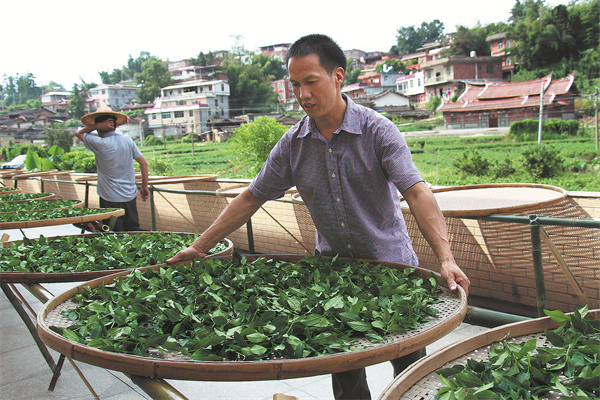

Tieguanyin tea expert not only helps to promote the traditional brew but also works hard, so that young people can find their feet in the business and improve skills, Wang Ru reports.
For 58-year-old Chen Lianggu, tea is a magical elixir. It's a belief that stems from his teenage years, that tea can help cure illness. When he was a youngster, while he was busy reaping rice on the farm, he began to suffer from heatstroke. Feeling uncomfortable, he went back home and explained the situation to his mother.
She found some tea, roasted it with salt, and then added it to boiling water. About half an hour after drinking that cup of tea, Chen felt fully recovered.
Chen admits that it's hard to tell whether the tea played a major role in his recovery, but the incident certainly planted a tea-loving seed in Chen's heart.
Now a provincial-level inheritor of making Tieguanyin, a variety of oolong tea (a half-fermented type of tea in China) in Gande town, Anxi county, Fujian province, Chen has been devoted to the tea-making craft for more than two decades.
He has won a number of prizes for his skills as a craftsman and his tea has won many prizes at competitions, as well as having been sold to many places in China and overseas.
At first, processing tea did not seem any more profitable than farming, and the people of Anxi didn't rush to get involved, despite the area's ideal geographical conditions to plant tea trees, and many locals growing them.
Both of Chen's parents were good at tea production. As farmers, they had a heavy workload all year round, but they still processed tea in their free time. According to Chen, in his mother's mind, tea leaves hidden in deep mountains were precious, and every year in slack seasons, she hiked in the mountains to pick some, and made tea by herself. She often wrapped up the tea she made in a cloth bag, hung it under a beam in the kitchen, and took some to drink or use as a medicine when necessary.
After dropping out of middle school because of poverty, Chen began to work as both a carpenter and farmer, with his carpentry welcomed by the locals.